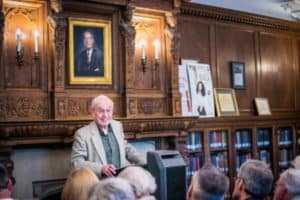
As a young adult Episcopalian, I was confronted by a graduate school colleague who asked me how I could stand to say the “same printed prayers every week.” After giving it some thought, I responded to my friend, “Baptists say the same prayers every week, too. They just aren’t written down.”
My schoolmate’s query was not without merit, however. What was it about the structure of the liturgy that made me feel so much at home, from the opening prayer of humble access to the closing dismissal? Even today, as a Baptist minister, I long for the regularity of liturgical ritual, a certain corporate discipline that puts the congregation all on the same page (pun intended).
But in fact, our prayers were not the same every week. The Book of Common Prayer stood as a veritable encyclopedia of intercession, both in weekly form (when was the last time your church prayed for government leaders by name or title?) and in the so-called “occasional intercessions.” In the latter category, one prayer, indeed one line of one prayer, still nags at me today. It begins, “Oh Lord, who putteth the lonely in families…”
Who is this Lord, and where are the families receiving the lonely?
…where are the families receiving the lonely?
I don’t have to ask where the lonely people are. They are legion.
If the lonely were not legion, inmates leaving jails and prisons would have communities of support to receive them, help them obtain employment, and provide the structure and resources that militate against recidivism.
If the lonely were not legion, communities of support would rally around those experiencing unexpected pregnancies, and assist them in becoming the strong families that God intended.
If the lonely were not legion, Alcoholics Anonymous and their recovery support groups would be ministries of the church, rather than simply renting space at the church.
If the lonely were not legion, teen suicide would be on the decline, whether in suburban bedrooms or on city streets.
If the lonely were not legion, the media (social and otherwise) would not serve as a primary source of identity construction for youth and young adults.
If the lonely were not legion, “irreconcilable differences” would not be a legal term.
Where is this Lord, and where are the families he “putteth the lonely in”?
Congregations ought to be just that—bodies where people congregate, come together, embrace one another. Alas, fueled in part by a focus on “entertainment,” many of our churches behave as if all the action is up front in the pulpit and the choir loft, and that those in attendance are somehow clients or consumers whose attention spans have shrunk so much that their senses must be stimulated, even titillated, for them to see God.
…many of our churches behave as if all the action is up front in the pulpit and the choir loft, and that those in attendance are somehow clients or consumers.
But I am not only worried about how such worship misses God. I am also concerned about how such worship further alienates us from each other. If my attention is focused exclusively on what’s up front on the sanctified stage (oops, pulpit), I probably won’t notice the person sitting in the pew next to or in front of me.
There’s an old joke about a man who, bumping into another man at the grocery store, thinks he may be a fellow member of his church. “I think I recognize you,” he proposes. “Let me look at you from the back.”
This season exacerbates the extant loneliness right around us. If you still don’t know any lonely people, feel free to refer to the above list. Or maybe try a family photo. Or a mirror.
May the legion of the lonely nag at us this. May we be moved to seek the lonely out, and offer the love, fellowship, and support that are clearly proclaimed in Isaiah’s declaration that Jesus is “God with us.”
Harold Dean Trulear is director of the Healing Communities Prison Ministry and a fellow at the Center for Public Justice and is co-editor of Ministry with Prisoners & Families: The Way Forward. A member of the Executive Session on Community Corrections at Harvard’s Kennedy School of Government, Dr. Trulear is also an associate professor of applied theology at Howard Divinity School in DC and on the pastoral staff of Praise and Glory Tabernacle in Philadelphia, PA. This article first appeared in PRISM.


